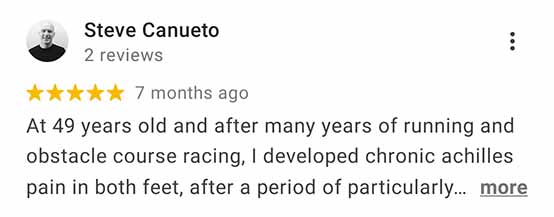Does your Achilles tendon feel sore and/or stiff when you take your first few steps in the morning? This may be a sign that you have Achilles tendonitis or tendinopathy. This article explains why it feels like that and what you can do to help it heal. Remember, if you need more help with an Achilles injury, you're welcome to consult one of our team via video call.

The terms tendinitis, tendonitis, tendinosis, and tendinopathy mean the same thing for all practical purposes, and we use these interchangeably in our articles.
In this article:
I've also discussed it in this video:
What is Achilles tendonitis or tendinopathy?
Achilles tendonitis or tendinopathy (the same thing by different names) is an overuse injury. It can be caused by:
An activity that subjects your Achilles tendon to much more force than what it is used to. Examples include running or walking lots of hills when you’re used to flatter terrain, walking far in flat sandals when you’re used to shoes with a slight heel, or an activity that involves hopping or jumping when you’ve not done this for quite some time.
Not allowing your tendon to recover fully between hard training sessions (walking/running/jumping). For example, doing too many high intensity running sessions (hills, speed work, track running) in rapid succession, or doing too many races spaced closely together.
When you push the tendon too far beyond its capacity or do not allow it to recover properly after exercise, a part of the tendon gets injured.
Your tendon is NOT tearing when you take your first steps in the morning!
Here’s a comment that I hear way too often: “I've been told that my Achilles tendon shrinks during the night, and every morning when I wake up, it re-tears.” This is absolute nonsense!
Why does this comment make me so angry? Because it sounds terrifying and often frightens people into not moving or not doing the exercises they have to do to help their Achilles tendon heal.
The research has clearly shown that you DON’T have tears in your tendon when you have Achilles tendonitis or tendinopathy. If you’re interested in the details of what exactly happens in your Achilles tendon, you can find them here. But I’ll discuss the relevant highlights below.
Why does your tendon feel so stiff and/or sore in the morning?
Healthy tendons are very strong structures with a large number of collagen fibres tightly packed parallel to each other. It’s this parallel structure that makes tendons so strong. It also has a little bit of fluid-like substance and a few cells between the fibres.

Once a tendon develops tendonitis/tendinopathy, the affected fibres move slightly apart and becomes disorganised. The fluid-like substance in that part of the tendon also increases.

When you’re asleep and lying quite still, the fluid-like substance accumulates and the nerve endings in that area becomes sensitised. When you then try to walk on it first thing in the morning, it can feel stiff and sore. However, the mechanical pressure caused by moving around helps to dissipate the fluid. So once you’ve moved about a bit it feels more comfortable.
So, even though it feels really sore and uncomfortable, you’re not damaging your tendon when you move about in the morning.
Note that, while some movement is good for your injured tendon, you can irritate it further if you do too much. So, make sure that you get guidance from a physio on the activity level you should aim for, depending on where you are in the healing process.
Not everyone will have pain as well as stiffness
People with Achilles tendonitis or tendinopathy can experience either pain, stiffness, or a combination of pain and stiffness in the mornings. Experiencing only the one and not the other or a combination of the two is not an indication of the severity of your injury.
However, if you wake up in the morning and your Achilles tendon is significantly more stiff or sore than what it normally feels first thing, it can be a sign that whatever activities you did the previous day were a bit too much for the tendon and that you should adjust them.
That’s why we teach our patients to monitor their 24-hour pain/stiffness response to ensure that their exercises and other activities are pitched at the correct level.
How can you get it better?
The best way to get your injured Achilles tendon to recover is a combination of decreasing aggravating activities (this allows the tendon to settle down) and a carefully graded strength training programme (this rebuilds the tendon’s strength).
It’s important that the strength training is pitched at the correct intensity for your injured tendon and takes your end goals into account. This is why no two tendon rehab programmes will look the same.
A typical strength training programme for Achilles tendinopathy should start with low-load exercises and then increase in intensity and complexity as your tendon recovers and grows stronger. If you kick off with exercises that are too strenuous or if you progress them too quickly, it will just irritate your tendon further. On the other hand, if you stick with doing the same exercises at the same intensity for too long, you won’t see much progress.

How we can help
Need more help with your Achilles injury? You’re welcome to consult one of the team at TMA online via video call for an assessment of your injury and a tailored treatment plan.

We're all UK Chartered Physiotherapists with Master’s Degrees related to Sports & Exercise Medicine. But at Treat My Achilles we don't just value qualifications; all of us also have a wealth of experience working with athletes across a broad variety of sports, ranging from recreationally active people to professional athletes. You can meet the team here.

About the Author
Maryke Louw is a chartered physiotherapist with more than 15 years' experience and a Master's Degree in Sports Injury Management. Follow her on LinkedIn or ResearchGate.











